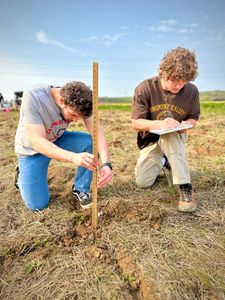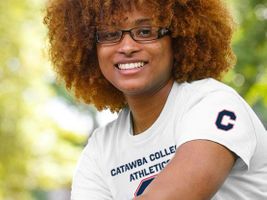
Under the leadership of Dr. Laura DeWald from the University of Kentucky Forestry, the partnership has resulted in the establishment of a White Oak Progeny Test Site in North Carolina. The site went live this week, marking a significant milestone in collaboration and research efforts aimed at advancing conservation and reforestation initiatives.
Students from two different classes at Catawba in the Department of Environment and Sustainability were assisted by State Foresters, Master Gardeners, and individuals from the University of Kentucky in planting 400 trees at the progeny test site. The trees originated from 30 mother trees across five states.
Brad Graham, Superintendent of the Piedmont Research Station, has been instrumental in preparing the site for planting and installing the necessary infrastructure to support the research efforts. The site, the first of its kind in North Carolina, signifies Catawba’s leadership role in the project, with support from NC State, University of Kentucky, Piedmont Research Station, and Rowan County Cooperative Extension.
“Our collaboration with the University of Kentucky has been instrumental in advancing our understanding of White Oak genetics and tree improvement,” said Dr. Lee Ball, Catawba’s Center for the Environment Executive Director. “Through initiatives like the Envirosmart Schools Program, we are not only contributing to scientific research but also nurturing the next generation of environmental stewards.”
Catawba has been actively involved in research for two years, collecting genetic material from the region and contributing to the study at the University of Kentucky. The establishment of the progeny test site signifies a significant step forward, providing students with hands-on learning opportunities and contributing to broader efforts in conservation and reforestation efforts.
White oak trees are critical to the health and ecological functioning of the forests in which they occur. They are also economically important for a variety of products, including barrels to age bourbon. Many white oak trees have not been replaced by younger trees as older ones have been removed through natural mortality or harvesting.
This project was developed to provide a sustainable supply of high-quality white oak through a tree breeding program. White acorns were collected from throughout the white oak’s geographic range. The best seedlings from each acorn collection grown at the Kentucky Division of Forestry Nursery were transplanted to progeny tests throughout the geographic range of the white oak. After 15 years, the trees will be used as a seed nursery for reforestation and tree enhancement projects.
